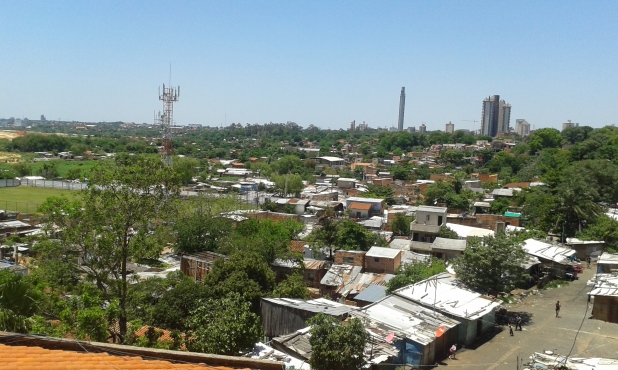On March 8th I’ll have 30 days left in Paraguay. At that point, I’ll no longer be able to deny the countdown I’ve struggled against by hiding behind weeks and months before departure. The days are numbered like pages. As with a good book, I’m excited to start a new chapter, but sad to move forward because the story is so interesting I could just stay in the middle of it…indefinitely.
March leading to April is a good time in Paraguay. School is up and running again, students pass my house in their uniform skirts, pants, and leather shoes. The weather starts to cool and the citrus are coming in–lemons and fat grapefruit, oranges and mandarins will come later. Catholics begin to prepare their souls for Easter. This year Easter week, called Saint’s Week here, falls in March. I arrived in my community for Saint’s Week two years ago and I will leave Paraguay just after it this year. Saint’s Week is the week of chipa, family, and disturbing TV series about the rise, fall, and rise of Jesus.
During March and April two years ago I was finishing my Peace Corps training and adjusting to my new home in my community–everything was a first. The same months last year, I was glowing with the accomplishments of a volunteer who rocked her first year in site and had stellar prospects for the coming year. This year, I’m saying goodbye and everything is turning into a “last.” It is hard to imagine things that have been fundamental in my life for two years as lasts… My last party in site dancing until dawn. My last soccer game. My last…Why does “last” have an innately depressing ring to it?
The days are numbered and it would be a lie to say that I’m not ready to take the leap to the next thing. When I leave my little house on a Paraguayan hill, I have three weeks of wandering until I land in my next home, which will be in northern Vermont. Vermont will be a launching pad; there I’ll be catapulted into the trajectory of becoming a doctor. I’ve had two thoughtful years in the hot, humid land of Paraguay to meditate on doctor-hood. It is the right road to take next, but the irony of leaving Paraguay to go to Vermont to germinate my new self is not lost. Anything can flourish in Paraguay, but only the hardiest of seeds sprout and produce in Vermont’s stingy sun.
I do not miss places. Place inherently have a mix of favorable and annoying characteristics. And, in most walks of earth, I can adapt and even prosper in the mix of features that makes the place.
I do not miss entire cultures. Cultures are like ecosystems; they have many parts that rely on each other to stay together. Like I find it difficult to appreciate mosquitoes and ants, I find it impossible to accept every aspect of a culture. There are beliefs I adore and there are those I hate. I navigate by focusing on what resonates with me and ignoring the rest to the best of my ability.
I miss people. I feel their absence from my heels to the top of my messy bun. There are lots of people in our world, but there are few individuals who are mostly good. In Spanish we could call those people who tip the balance dramatically to the side of kind, fun, and just “buena anda.” “Buena anda” translates to something like “good way” or “good walk”– maybe the English phrase is “good people.” I’ve struck a fortune and made friends with some buena anda people in Paraguay. And, the readiness I feel to leave the red earth of the Guarani is dulled by the thought of moving far away from the people I love here.
My young Paraguayan friends have Facebook. There is the mail system and the chance that I will return to Paraguay for a visit. Yes, it is undeniable that the tools to “stay in touch” are available. But, having played this game of geography before, I know it is not the tools that are the most important factor to staying connected.
My closest friends and I can pick up where we left off after any amount of time, and no matter how brief our reconnect. And, my Paraguayan friends will be like that, we will carry on when we talk or are together. But, I have learned that as life goes on the time between catch-up sessions with far away friends grows. It lengthens until the relationship is mostly founded on the memories of times when we lived close. I have vivid and profound memories with my friends from this overlooked, South American country. I know what we shared will live on in our metaphorical hearts. But, I still find myself pausing in the way I learned during my years sweating in the Paraguayan humidity and lounging in mango shade.
The days are numbered. I can count them. Soon the count will be zero and I will embark on the road less traveled. I must go. I want to go. But, I don’t want to forget. I don’t want the people I knew here to fade in my life like old photographs. I don’t want the indescribable understanding of life that Paraguay gave me to get lost in a cobweb corner of my mind. Now, as I look to the horizon, I don’t just ask what is to come. There is a more emotional question that plagues me: How will I remember?







